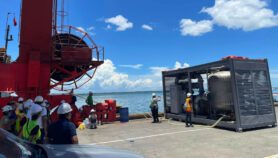By: Aisling Irwin
Send to a friend
The details you provide on this page will not be used to send unsolicited email, and will not be sold to a 3rd party. See privacy policy.
Talks on the proposed outcome document for nations to sign at the UN Conference on Sustainable Development (Rio+20) in Brazil next month (20-22 June), have been marked by divisions on some of the key concepts such as a green economy, and the institutional framework for sustainable development — as well as individual words and phrases.
The latest round of 'informal-informal' negotiations in New York this month (27 April–4 May) finished with little agreement and the outcome document was running to more than 400 paragraphs.
So a new 'streamlined' text is being written by the co-chairs of the negotiating process — and is due to be published next week.
This week (16 May) the World Bank's special envoy for climate change added his voice to appeals for nations to rise above such concerns.
"How could we have got ourselves into this situation where we are clearly failing to grasp the urgency," he asked.Any observer of the latest negotiations would have found it "impossible to believe that we are serious about solving these problems," Andrew Steer told a Brussels meeting where the European Development Report was launched.
Leaders of the Scientific and Technological Community Major Group, one of nine groups that have had formal input into the negotiations, told SciDev.Net they were pleased that the importance of science remained highlighted in the introductory text in a paragraph that was among the 20 or so that have been generally accepted.
"[The paragraph] states clearly that [negotiators] recognise the important contribution of the science and technology community to sustainable development and that they are committed to working more closely with them," said Alice Abreu, emeritus professor of sociology at the Federal University of Rio de Janeiro, Brazil, and Rio+20 regional coordinator for the International Council for Science (ICSU).
But apart from mentions in the introduction, the broader commitment to science and innovation had dissipated from the text by the time the New York negotiations ended, according to Gisbert Glaser, senior advisor at ICSU, in France.
Science "is mostly absent, and innovation is limited to technological innovation," in a section entitled Technology Transfer, Research and Development, Innovation, he said.
"Rio+20 provides a unique opportunity to set in motion an effective 'global innovation system'," he said.
Such a system could be "based on sound science, including in the social and economic sciences; enhanced R&D efforts in all nations and economic sectors, and enhanced testing and deployment of innovations of all kinds, in both our urbanised world and in rural areas".
While critics have contrasted negotiators' obsession with small words and phrases with the vastness of the challenges they are seeking to overcome, others have said that much of Rio+20's success may not lie solely in the outcome document but, rather, in commitments made at individual national, regional and city levels.
The World Bank, for example, wants 50 countries to sign up to 'natural capital accounting', an effort to quantify the contribution of natural resources to a nation's wealth.
The next round of talks begins on 29 May.
This article is part of our coverage on Science at Rio+20.













